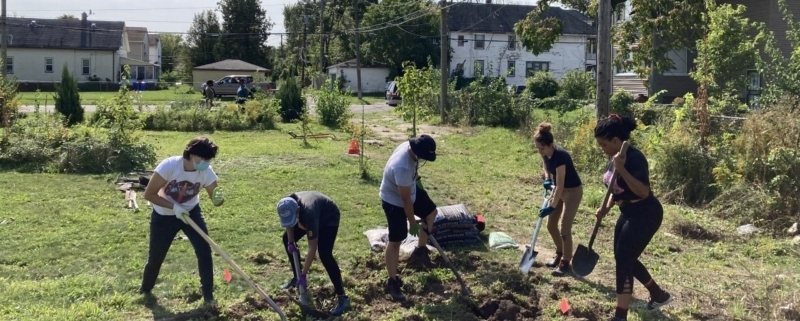Corridors of Community: WHC and partners secure funding for alley activations in Detroit
After a decades-long hiatus, the city of Detroit is reinvesting in its alleyways, creating new opportunities for economic, environmental and social progress. Recognizing the potential for these alleys to foster biodiversity, community-building and climate resilience, WHC and a group of Detroit-based partners have initiated, and recently secured a new source of funding for a locally focused alley activation project.
The $50,000 award was secured through the Thriving Cities Challenge, which was hosted by the Salazar Center for North American Conservation at Colorado State University. This funding will underwrite the development and implementation of a new project in the community of East Canfield, Detroit: Alley Activation as a Neighborhood-Based Sustainability Strategy. The endeavor will be led by nonprofit community development organization Canfield Consortium, which was founded by sisters Rhonda and Kim Theus, who grew up in East Canfield and seek to revert the neighborhood’s alleys back to the thriving community spaces they were before the city stopped maintaining them over the course of the 1970s and 1980s.
The alley activation will focus on installing green infrastructure and promoting placemaking and hyperlocal economic development within the selected alleys. WHC will continue to play an important role in the effort, using its three decades of experience supporting corporate-led conservation, community engagement and STEM education initiatives to drive corporate and youth participation in the project.
The Road to Revitalization
As one of the 15 finalists of the Thriving Cities Challenge, WHC and its partners, Canfield Consortium, University of Michigan-Dearborn and Detroit Ain’t Violent It’s Safe (DAVIS), were awarded $10,000 in capacity-building funding. The team applied this money towards a pilot project, which included a community tool library from which residents can borrow gardening supplies for use in the alleys or at home, a mural depicting children playing and a community member holding the earth in his hands, and a rain garden that moderates stormwater while providing habitat for pollinators. With support from the DTE Foundation, WHC organized two volunteer days: an alley cleanup event (with strong support and the donation of waste disposal from WHC member Waste Management) and a planting session for the rain garden. Each event was attended by about 20 people, a combination of East Canfield residents, corporate volunteers and UM-Dearborn students.
Following completion of the pilot projects, the 15 finalists participated in a virtual, competitive pitch event, where each applicant presented their concept to a panel of reviewers. The Thriving Cities panel opted to fund the top eight pitches, with WHC and its partners finishing in second place. The funded projects vary greatly in scale, scope and location but all demonstrate a commitment to the challenge’s focus on promoting racial equity, leadership and climate resilience within communities of color in North America.
A Long Overdue Opportunity
In a recent interview with Planet Detroit, Rhonda Theus explains that, “when we were growing up, alleys were social spaces” where children played and community members held events and meetings. The city of Detroit’s decision to stop maintaining the alleys came at a time when the city’s population was declining and access to resources became scarce — the confluence of these factors caused many alleys to become overgrown and filled with litter, and residents began to avoid what were once community spaces.
In recent years, as the city has recommitted to clearing the alleyways, various organizations have attempted to use these spaces for green infrastructure projects. Many of these efforts, however, have failed to secure community input or buy-in. Without community engagement, such projects can exacerbate existing inequalities. In contrast, Alley Activation as a Neighborhood-Based Sustainability Strategy was initiated by East Canfield residents, with community members in key leadership roles. Residents’ ideas, skills and talents have been integrated into the project design, underscoring the project team’s commitment to driving local empowerment alongside ecological uplift. In addition to the work done during the pilot project, planned alleyway activities include:
- Engagement of neighborhood stakeholders in process planning.
- Construction of kiosks for local entrepreneurs to showcase their skills and promote their products on a rotational basis and during community events. Speaking to the project’s potential for economic development and community-building, Korey Batey of DAVIS says, “The skills and talents we seek within our community, in most cases, exist just a few doors down. This project highlights the residential potential of doing business in our own backyards.”
- Installation of a pollinator habitat to benefit local wildlife and provide education and recreation opportunities.
- Development of hydrology and biodiversity curricula, created by WHC and supported by the DTE Foundation, that will teach students at nearby Barack Obama Leadership Academy to assist with important monitoring activities (measuring the water captured by the rain garden, identifying plants and pollinators). “WHC has always been a proponent of place-based STEM education,” explains Patricia Billette, Program Manager, Conservation & Community Engagement, WHC, “The curricula we create will give local students a unique opportunity for outdoor exploration and a chance to connect with the greater East Canfield community.”
- Establishment of a station where residents can drop off household waste for trash pickup, recycling or composting, and can pick up compost to use on alley plantings or in their own yards.
- Creation of a space for studying and performing cost/benefit comparisons of various green infrastructure projects, such as rain gardens and different types of permeable pavement.
- Installation of solar lights and a windmill that generates a Wi-Fi signal.
- Continuation of the team’s microbusiness development work and deeper engagement with UM-Dearborn labs and graduate students, who are assessing and articulating the project impacts.
The alley activation project in East Canfield will also provide local companies with opportunities for private investments, employee engagement, infrastructure redevelopment and community outreach.
In the long term, the project has the potential to inspire similar efforts across Detroit — Paul Draus of UM-Dearborn explains, “this project promises to demonstrate the viability of alleys as multifunctional green capillary corridors for breathing new life into stressed but resilient neighborhoods.”
If you or your organization would like to join WHC and its partners in activating Detroit’s alleys, please contact Patricia Billette at 240.247.0901 or pbillette@wildlifehc.org.
To learn more about Alley Activation As A Neighborhood-Based Sustainability Strategy and the other Thriving Cities winners, visit https://thrivingcitieschallenge.org/wp-content/uploads/2021/09/booklet.pdf.

